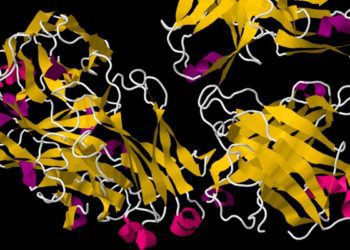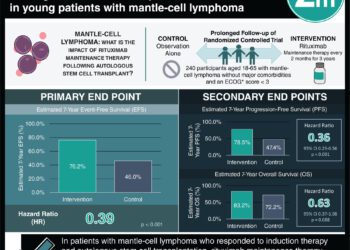The PREVENT trial: eculizumab reduces relapse risk in patients with neuromyelitis optica and aquaporin-4 antibodies
1. In this randomized control trial of neuromyelitis optica spectrum disorder (NMOSD) patients with aquaporin-4 antibodies (AQP4-IgG), those randomized to receive the eculizumab complement inhibitor experienced a lower relapse rate over 24 months than placebo treated patients.
2. Eculizumab patients more commonly experienced upper respiratory tract infections (URI) and headaches.
Evidence Rating Level: 1 (Excellent)
Study Rundown: Neuromyelitis optica spectrum disorder (NMOSD) is a recurrent autoimmune disorder mainly characterized by optic neuritis and myelitis. Rituximab is an approved treatment to prevent relapses but is not effective for all patients. AQP4 is a protein in the central nervous system which a majority of NMOSD patients have IgG antibodies to, and the AQP4-IgG complex leads to complement activation facilitating relapses. Eculizumab is a complement inhibitor thought to be efficacious at ultimately reducing NMOSD relapse events. The PREVENT trial (Prevention of Relapses in Neuromyelitis Optica) evaluated a primary outcome of first adjudicated relapse in placebo or eculizumab treated patients and found relapses occurred less in treated patients. Eculizumab treated patients had disability scores that trended towards improvement from baseline, though they did experience more URIs and headaches than placebo patients. One death due to pulmonary empyema occurred in an eculizumab patient.
This randomized control trial suggests notable efficacy of eculizumab in preventing NMOSD relapses in a major subpopulation of patients. While the efficacy data is marked, the study is limited by the difficulties in interpreting an NMOSD relapse which ultimately stopped the trial.
Click to read the study in NEJM
Relevant Reading: Failure of natalizumab to prevent relapses in neuromyelitis optica
In-Depth [randomized controlled trial]: This phase 3, multinational, double-blind, placebo-controlled, randomized trial enrolled patients between 2014 and 2017. Eligible patients were adults with NMOSD, AQP4-IgG positive, were not severely disabled, and had a history of multiple recent NMOSD relapses. Those who received recent rituximab or other immunotherapies were ineligible. Patients were randomized to an eculizumab (n=96) or placebo (n=47) group. Patients were dose escalated up to 1200mg eculizumab biweekly by the time the trial began. The primary end point was time to first adjudicated relapse, with relapses determined by a 3-physician committee based on data gathered by treating physicians. Prior to randomization, the mean annualized relapse rate was 1.99 for all patients. More eculizumab patients discontinued the trial (17% vs 6%). Adjudicated relapse occurred in 3% (3/96) and 43% (20/47) of the eculizumab and placebo groups, respectfully (hazard ratio, 0.06; 95% confidence interval [CI], 0.02 to 0.20; P<0.001). In treating physician determined relapse, 15% and 62% of eculizumab and placebo groups experienced an event (hazard ratio, 0.18; 95% CI, 0.10 to 0.34; P<0.001). Disagreements between treating and committee physicians on which events were considered relapses resulted in trial stoppage. Eculizumab patients had a lower annualized rate of relapse (0.02 vs 0.35, respectfully; P<0.001). The change in disability score from baseline trended towards improvement in the treatment group but was not significant (least-squares mean difference, -0.29; 95% CI, -0.59 to 0.01). URIs and headaches were more common in the treatment group. One treatment patient who was on concurrent azathioprine died due to pulmonary empyema.
Image: PD
©2019 2 Minute Medicine, Inc. All rights reserved. No works may be reproduced without expressed written consent from 2 Minute Medicine, Inc. Inquire about licensing here. No article should be construed as medical advice and is not intended as such by the authors or by 2 Minute Medicine, Inc







